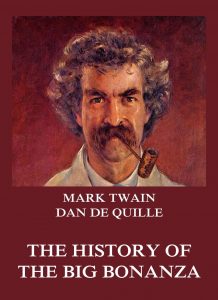History of the Big Bonanza – Mark Twain
One easily gets a surface-knowledge of any remote country, through the writings of travelers. The inner life of such a country is not very often presented to the reader. The outside of a strange house is interesting, but the people, the life, and the furniture inside, are far more so. Nevada is peculiarly a surface-known country, for no one has written of that land who had lived long there and made himself competent to furnish an inside view to the public. I think the present volume supplies this defect in an eminently satisfactory way. The writer of it has spent sixteen years in the heart of the silver-mining region, as one of the editors of the principal daily newspaper of Nevada; he is thoroughly acquainted with his subject, and wields a practiced pen. He is a gentleman of character and reliability.
Format: Paperback
History of the Big Bonanza.
ISBN: 9783849674960.
Available at amazon.com and other venues.
Biography of Mark Twain (from Wikipedia):
Samuel Langhorne Clemens (November 30, 1835 – April 21, 1910), better known by his pen name Mark Twain, was an American writer, humorist, entrepreneur, publisher, and lecturer. Among his novels are The Adventures of Tom Sawyer (1876) and its sequel, the Adventures of Huckleberry Finn (1885), the latter often called “The Great American Novel”.
Twain was raised in Hannibal, Missouri, which later provided the setting for Tom Sawyer and Huckleberry Finn. He served an apprenticeship with a printer and then worked as a typesetter, contributing articles to the newspaper of his older brother Orion Clemens. He later became a riverboat pilot on the Mississippi River before heading west to join Orion in Nevada. He referred humorously to his lack of success at mining, turning to journalism for the Virginia City Territorial Enterprise. His humorous story, “The Celebrated Jumping Frog of Calaveras County”, was published in 1865, based on a story that he heard at Angels Hotel in Angels Camp, California where he had spent some time as a miner. The short story brought international attention and was even translated into French. His wit and satire, in prose and in speech, earned praise from critics and peers, and he was a friend to presidents, artists, industrialists, and European royalty.
Twain earned a great deal of money from his writings and lectures, but he invested in ventures that lost most of it—notably the Paige Compositor, a mechanical typesetter that failed because of its complexity and imprecision. He filed for bankruptcy in the wake of these financial setbacks, but he eventually overcame his financial troubles with the help of Henry Huttleston Rogers. He chose to pay all his pre-bankruptcy creditors in full, even after he had no legal responsibility to do so.
Twain was born shortly after an appearance of Halley’s Comet, and he predicted that he would “go out with it” as well; he died the day after the comet returned. He was lauded as the “greatest humorist this country has produced”, and William Faulkner called him “the father of American literature”.
(The text of the last section was taken from a Wikipedia entry and is available under the Creative Commons Attribution-ShareAlike License.)
Publisher’s Note: This book is printed and distributed by Createspace a DBA of On-Demand Publishing LLC and is typically not available anywhere else than in stores owned and operated by Amazon or Createspace.

